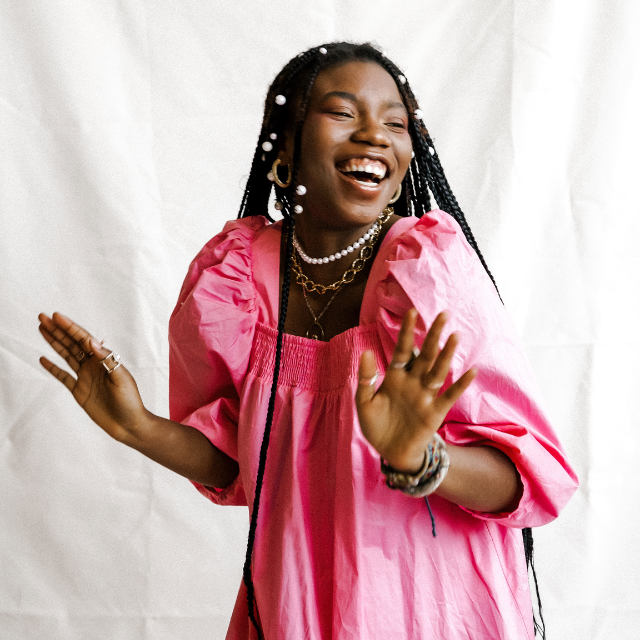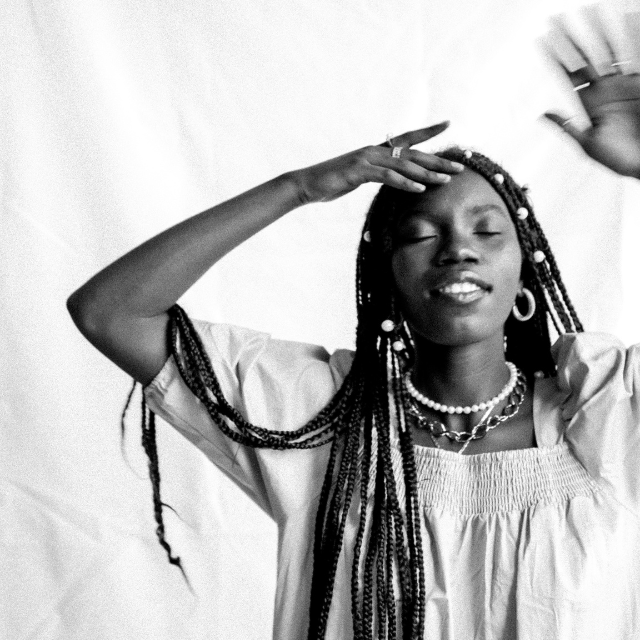
Photo Credit: Molly Schikosky
As defined by Oxford Languages, poetry is “literary work in which special intensity is given to the expression of feelings and ideas by the use of distinctive style and rhythm….” As the expressive art form that spoke to the 20-year-old poet Peace Akintade over a decade ago - her Nigerian roots perceive language and therefore, poetry as a part of her culture rather than a profession. Still, it was not something she actively pursued at the onset of her journey. After two years of attending poetry readings at a particular venue in Saskatoon, she was invited to do a reading by members of the club who recognized her familiar face.
There on the stage, Peace found that in her performance, a connection to herself, her culture, and the spoken word as an artform bloomed.
Since then, the road has been daunting, marred with frustrations and a lack of clarity about how she could pursue the path calling to her heart. Through her lens and experience, the poetry community felt elitist, and Peace faced discrimination based on her race and age.
“As a Black woman and refugee in Saskatoon, I have had my race and age called out in the community. It can be very hard to practice authentically when you feel like you don’t belong.”
Despite these and other challenges, Peace’s love of poetry flourishes, and she has gained local and national recognition for her craft over the last few years. She was the Saskatoon Youth Slam Champion from 2017 to 2019, Saskatchewan Youth Poet Laureate from 2020 to 2021 and is the Saskatoon Poet Laureate for 2022. Peace Akintade is also the recipient of the 2022 RBC Emerging Artist Award at the Saskatchewan Arts Awards.
The arts community is not free from cynicism, with many members giving voice to the opinion that recognition in the form of awards is an outdated practice that pits artists against each other. Peace disagrees. For her, the award boosted her confidence, opened doors for access to opportunities and introduced her to the work of other artists.
“I enter rooms more confidently, as a result of the award,” said Peace. “It has helped me feel like I belong in the space, where I have such deep respect for other artists’ work.”
From her experience and despite the hope that this will eventually change, recognition carries extensive weight among the experienced members of the arts community, tying that recognition to respect for an artist’s work. Consequently, many emerging artists face closed doors without that acknowledgement and associated respect.
"I don't necessarily disagree with the sentiment that the SaskArts Award is outdated, but that the recognition from the award is a important element to someone's art and personhood. That perspective should also be taken to account." Peace said.
For the young poet, the nomination for the Saskatchewan Arts Awards was also a jarring catalyst for self-reflection, being present, and an opportunity to connect and forge friendships with the other nominees.

Photo Credit: Molly Schikosky
She shares that, from her perspective, an award for one is an award for all. Having to navigate those barriers in getting your work recognized is work, but she says that artists, especially those from under-represented communities must continue to do it by penetrating the space and doing the work from the inside out.
“It is nice to have your work recognized. It also allowed me to network and build bonds with other nominees.” Peace said, “But its more than that. Spoken word being recognized as an artform is bigger than just me. Receiving the Saskatchewan Arts Award gives me more access to space, but also allows conversations like this one to be had. How can we, people who look like me, infiltrate space?”
Peace Akintade is currently in the throes of multiple projects. She is serving as an Artist in Residence with the Remai Modern Gallery as part of their Here And Now: Live Art Initiative, working to improve access for BIPOC youth to interdisciplinary poetry in Saskatoon. She is finishing her undergraduate degree in anthropology, where she is focusing on interdisciplinary anthropology as a means of preserving culture. She is also working on the manuscripts of her debut poetry book, while looking forward to prioritizing rest and reconnection to her love for writing and poetry.
Peace remembers her struggles at the beginning of her journey - her difficulty finding a clear path even while knowing that she wanted to pursue poetry as well as feeling unwelcome within those spaces. She encourages young artists to look for spaces where they belong, since community, for her, is the backbone of progress. She found her space and her community at Write Out Loud where she is now a program coordinator. She advises other young people to find that type of environment for themselves.
"I did not know there was a space for me. And that affected my work. So, find your space, your community."
